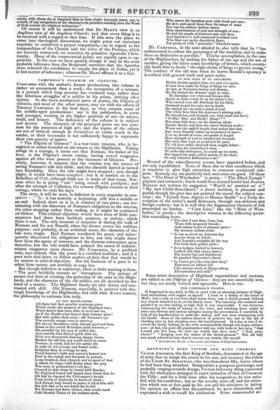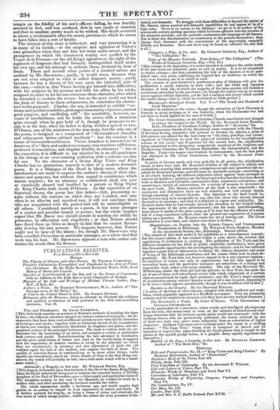BROWNING'S KING VICTOR AND KING CHARLES. VICTOR AMADEUS, the first
King of Sardinia, determined at the age of sixty-four to resign his crown to his SOB, and to marry the widow of the Count Sr. SEBASTIAN, who was then about fifty, but to whom he had been long attached. Being rather a pompous personage, and probably verging towards dotage, Vieroa had every thing connected with the abdication arranged in exact imitation of that of CHARLES the Fifth : and for a little time after his resignation, he was satis- fied with his condition ; but as the novelty wore off; and the atten- tion which was at first paid by his son and his ministers in taking his opinion on affairs was discontinued, he grew dissatisfied, and expressed a wish to recall his abdication. Some unsuccessful at-
tempts on the fidelity of his son's officers failing, be was forcibly arrested in bed, and was confined, first in one castle or mansion and then in another, pretty much as he wished. His death occurred in about a twelvemonth after his arrest, previous to which he seems to have fallen into a sort of fatuity.
The interest of this story is historical: and very interesting it is in many of its details,—as the surprise and agitation of Victor's own grenadiers when they saw him led down under arrest, and the promptness by which the threatened mutiny was quelled by the Count de la Perouse—or the old King's agitation at the sight of the regiment of dragoons that had formerly distinguished itself under his own eye, and his attempt to address them, drowned by beat of drum. These and several other points of a kindred nature are omitted by Mr. BROWNING; partly, it would seem, because they are not even adapted to what is called dramatic poetry ; partly because he has a theory of his own upon the historical part of the case,—which is, that Victor having got himself into difficulties, with his subjects by his tyranny and with his allies by his tricks, resigned in order to let his son overcome these obstacles, after which he intended to reclaim the crown : but as the poet could not bend the facts of history to these refinements, he constrains his charac- ters to his purposes. Charles, the son, is intended to exhibit "ex- treme and painful sensibility, prolonged immaturity of powers, earnest good purpose, and vacillating will " : his sensibility, however, sa- vours of mawkishness, and he holds the crown with a tenacious gripe enough when he gets hold of it, though he proposes to re- sign it at the last, when his father is dying within a speech or two. D'Ormea, one of the ministers of the true story, but the only one of the poem, is designed as a compound of "ill-considered rascality and subsequent better-advised rectitude" : but his conduct is a tissue of incomprehensibleness. Victor Amadeus is intended to be drawn as of a "fiery and audacious temper, unscrupulous selfishness, profound dissimulation, and singular fertility in resources " : but in the execution, it is difficult to say whether he is an old gentleman in his dotage or an over-cunning politician with a scheme too fine for use. To the character of a drama King Victor and King Charles has no pretension, scarcely to that of a modern dramatic poem. It is a Dialogue of the Dead in blank verse, where the interlocutors are made to express the author's theory of their cha- racter and purposes, but without that regard to consistency which nature requires ; for no attorney or confidential clerk was ever sy ematically abused 'and insulted by a patron as King Victor an King Charles both insult D'Ormea. As the exposition of an historical theory, the poem has this defect—that, presenting re- sults without the reasons on which they are founded, and very often in an allusive and mystical way, it will not convince those who are acquainted with the period and will be unintelligible to all others. Considered merely as a poem, it has some passages of a quaint and peculiar beauty or power ; but the whole inspires regret that Mr. Baow ISO should persist in marring the ability he possesses, by affectation and singularity ; or that Nature should have fixed these qu lities so deeply in him that he cannot favour- ably develop his own powers. We suspect, however, that Nature ought not to bear all the blame ; for, though Mr. BROWNING may have excelled Paracelsus in particular passages, as a whole that first work was his best. Mr. BROWNING appears a man who rather cul- tivates his weeds than his flowers.



























 Previous page
Previous page